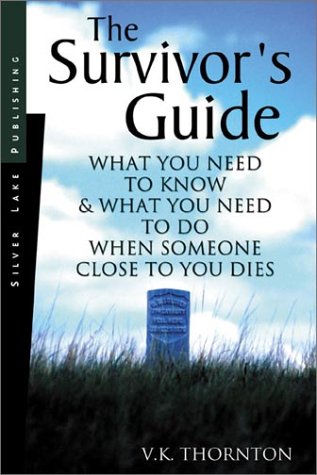 |
||
|
|
The
Survivor's Guide: What You Need to Know & What You Need to Do
When Someone Close to You Dies. V.K. Thornton. Silver Lake. 296
pages. $17.95
|
 |
BY
RICHARD PACHTER
rpachter@wordsonwords.com
Originally published on Monday, February 16, 2004 in The Miami Herald.
Death be not proud, but does it have to be so expensive?
Dealing with death is big business. The General Accounting Office
estimates
that more than $9.3 billion is spent annually on funerals in the
United States. Like many industries, the funeral and burial business
has undergone considerable consolidation during the past decade.
Mom-and-pop funeral
homes, as viewers of HBO's Six Feet Under well know, face larger,
sometimes predatory conglomerates that are eager to absorb them.
The peculiar needs of their clientele place these businesses in
a unique position. Though there are many caring professionals who
provide funeral and bereavement products and services, as we've
seen here in South Florida, here are others who take unfair advantage
of their customers.
TOUGH
DECISIONS
Think about how vulnerable the survivors are. A loved one -- mate,
parent, spouse, sibling, child or other close relative -- just died,
either after a slow deterioration or a sudden event. The loss is
almost always disturbing and traumatic, and the grieving survivor
at the same time must deal with funeral and burial arrangements,
which are not a cheap proposition.
Purchases of this magnitude are often subject to research, contemplation
and comparison. But grief-stricken survivors must usually make a
series of quick, complicated and expensive decisions. They're often
at a distinct disadvantage in dealing with the providers of the
requisite products and services.
Journalist V.K Thornton's new book is an attempt to prepare readers
for the unexpected -- and the inevitable. Here, she tackles a very
difficult subject with sensitivity, insight, curiosity, toughness
and fairness.
Fair, because she doesn't assume an adversarial stance toward the
business aspects of the process, though she's clearly on the side
of the consumer. Though mindful of the built-in disadvantage of
the bereaved, Thornton is appropriately skeptical as she goes through
each of the questions that must be addressed as part of the process
(from when and why autopsies are performed to what expenses are
negotiable and which are fixed).
EXTRA RESOURCES
The book includes checklists and other resources such as contact
information for state consumer organizations and a fairly extensive
bibliography.
The author does a very good job, though I did catch one error: Rep.
Mark Foley, who joined Sen. Chris Dodd in requesting a study from
the General Accounting office that showed the disparity of states'
regulation of funeral costs, is a congressman from Palm Beach, and
not a senator, as Thornton
states. (Dodd and Foley subsequently introduced legislation to extend
existing regulation of the industry as a result of the study, by
the way.)
Though Thornton forces readers to think about things that are often
ignored until the last minute, she also brings up a few other items
that are worth considering, including the nontaxable status of religious
organizations and how that affects their profitability in providing
funerals and burial, and
the other competitive advantages that such institutions exploit.
Thornton also may inspire readers to investigate their own loved
ones' plans. I did, especially after experiencing a challenging
situation with a parent a few years back (which I recounted in a
Tropic magazine article, available online here).
It's a question well worth asking, and after reading The
Survivor's Guide, just the first of many that ought to be addressed
by us all.
©2004 Words on Words, All rights reserved.